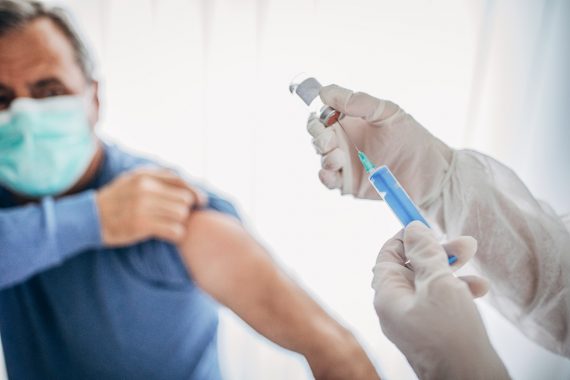GP-led Covid vaccination sites ‘should now offer appointments’ to patients aged 45-49 ‘where supply permits’, NHS England has said.
The new advice from NHS England, published yesterday evening, comes as Pulse revealed last week that GP sites were not due to get any new first-dose vaccine deliveries at all this week or next.
It also reiterates JCVI advice from yesterday which said GPs should encourage at-risk patients – including those who are male and obese – to get the jab when their turn comes.
NHS England said: ‘The National Booking System has today been opened to this group, and GP-led local vaccination services should now offer appointments to patients within this age range where supply permits.
‘As supply increases, we will write to you to confirm next steps on vaccinating the second half of cohort 10. The JCVI’s age-based approach continues to be based on evidence that hospitalisations and risk of critical care admissions increase with age, including for individuals who are under 50 years of age.’
But it said this comes as ‘as previously set out, most vaccination supply in April will be needed for second doses
or remaining first doses in cohort 1-9′.
‘Vaccination services should continue to ensure that people are offered their second dose in line with the JCVI guidance on dose intervals,’ it further stressed.
The UK Government announced the start of phase two of the vaccination programme this week, stating everyone in the first nine priority cohorts have now been offered a vaccine. Shortly after the announcement, the central vaccination booking system was reported as having ‘crashed’.
Despite the announcement, NHS England’s latest guidance said ‘national communications’ will ‘continue to encourage all of those in JCVI cohorts 1-9 who have yet to have been contacted or who would now like to access a vaccination to come forward’. Meanwhile, ‘updated materials aimed at encouraging uptake for those in cohorts 10-12’ are not expected to be shared until ‘toward the end of the month’.
The new document also said that the ‘eligible individuals aged under 30 who had their first vaccination appointment postponed following last week’s updated MHRA/JCVI guidance on Oxford AstraZeneca should now be being contacted… and offered an alternative vaccine (Pfizer or Moderna)’.
And, regarding at-risk patients, it said ‘deployment teams should actively promote vaccination uptake for
individuals who are: male, BAME, have a BMI of 30 or more, and those from areas of high socio-economic deprivation, given the heightened risk of hospitalisation for these groups’, linking to previously published advice on how to target ‘underserved communities’.
JCVI yesterday confirmed that the rollout will follow an age-based approach, starting with those aged 40-49, then 30-39s and finally the 18-29s – justifying the approach by saying a ‘simple’ prioritisation based on age would be rolled out most quickly.
With regards to concerns for extremely rare blood clots following vaccination, it reiterated that the ‘benefits of prompt vaccination’ with the AstraZeneca vaccine ‘far outweigh the risk of adverse events for individuals aged 30 years and over’, as well as those with underlying conditions.
However, alternatives will continue to be offered to those under 30, it confirmed.
Public Health England has estimated that 10,400 deaths from Covid-19 have been avoided due to the vaccination programme to the end of March.
NHS England’s guidance document said that ‘thanks to your ongoing leadership of the [programme] we have now been able to vaccinate 19 out of 20 people aged 50 and over, which is an important milestone in the most successful vaccination programme in the history of the NHS’.
Some 32 million people have now been vaccinated across the UK. In England, 6.5 million people have also had their second dose, including ‘three quarters’ of people aged over 80, NHS England said.
Pulse October survey
Take our July 2025 survey to potentially win £1.000 worth of tokens













